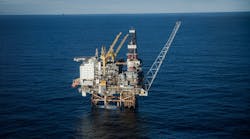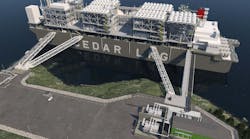Eric Watkins
Oil Diplomacy Editor
Iran’s President Mahmoud Ahmadinejad, visiting the Abadan refinery to underscore his nation’s ability to defy international sanctions, survived an explosion and fire at the facility that left 2 other people dead and 22 injured.
The Mehr news agency reported that Ahmadinejad and his accompanied delegation were “unhurt,” adding that a gas leak in one of the refinery’s units caused the blast.
“Two people were killed and 22 others were wounded due to the spread of poisonous gas inhalation and intoxication,” said Mehr, which added, “An investigation of the blast has commenced.”
Ahead of the results of that investigation, one member of Iran’s parliament indirectly criticized Ahmadinejad by announcing that the blast was the result of a foreseeable accident and not caused by sabotage.
“This incident was not an act of intentional sabotage,” said Hamid-Reza Katouzian, head of Iran’s parliamentary energy committee. “Experts had forewarned that Abadan refinery was not ready to be inaugurated.”
The denial of sabotage at Abadan follows a confrontation this week between Ahmadinejad and Iran’s Guardian Council, a powerful body of clerics and jurists, which ruled against the president’s earlier decision to appoint himself as the country’s caretaker oil minister.
Ahmadinejad announced that he will not attend the next meeting of the Organization of the Petroleum Exporting Countries as planned, and will send a subordinate instead.
Meanwhile, the Iranian president visited the Abadan refinery to inaugurate a unit that will increase Iran’s gasoline production capacity by an extra 4.2 million l./day—an increase much needed in the country with international sanctions cutting into imports.
New sanctions
Indeed, the refinery blast came as the US Department of State said it will impose new sanctions on Venezuela’s state-owned Petroleos de Venezuela SA as well as six other smaller oil and shipping companies for violating the US trade ban.
In addition to PDVSA, the other companies covered by the new US sanctions include PCCI, the Royal Oyster Group and Speedy Ship of the UAE, Tanker Pacific of Singapore, Ofer Bros. Group of Israel, and Associated Shipbroking of Monaco.
“All these companies have engaged in activities related to the supply of refined petroleum products to Iran,” said Deputy Sec. of State James Steinberg, who added that there is clear evidence that existing sanctions on Iran are pinching its oil and gas sectors.
“The intent of sanctions on Iran is to pressure it to comply with its international obligations,” said Steinberg, who explained that the main objective of the sanctions regime is to encourage Tehran to engage in real negotiations with the major powers over its nuclear program.
The State Department last year warned that it would closely monitor recent energy agreements between Venezuela and Iran to ensure that they do not violate international sanctions.
“We will watch to see if any of these deals…constitute a violation of the Security Council resolutions and sanctions against Iran,” said State Department spokesman Philip Crowley (OGJ Online, Nov. 1, 2010).
More Oil & Gas Journal Current Issue Articles
More Oil & Gas Journal Archives Issue Articles
View Oil and Gas Articles on PennEnergy.com

